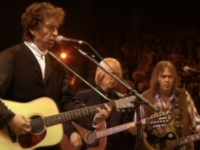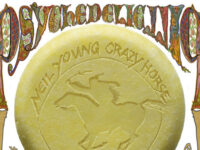It seems that no matter where you go, if you have a handful of musicians in the crowd, you can always strike up a conversation about Neil Young. Heck, you don’t even need musicians; because of his long career and iconic popularity, in any group there are always at least a few people who have heard enough of Neil’s music to have an opinion about it.
So, sometimes your spouse drags you out to some event like his or her company’s annual Christmas banquet, and it turns out the uncomfortable random stranger seated next to you knows a lot about music in general, and a lot about Neil Young in particular. This works out well; both of you can fill any conversational gaps over the next three hours with bits and pieces of trivia, apocryphal tales and personal testimonials about various stages of Neil’s career, allowing both of you to part ways later that evening, feeling that you dodged that social bullet successfully – for this year, anyway.
Of course, sometimes you get seated next to someone who shares no common interests with you whatsoever, which is a whole different problem. But odds are that even this albatross of a human being seated beside yourself probably knows something about Neil Young. And if you can turn the conversation in that direction, odds are that their knowledge is probably centered on the “classic” version of Neil Young as a king of folk-rock Trinitarian god composed of the performer (Neil); his offspring, the #1 album (Harvest); and the intangible yet all pervasive holy spirit of the airwaves, the #1 single (“Heart of Gold”).
Now, you might ask, what about the song Old Man — which peaked at No. 31 in June of 1972? “Oh yeah – I like that too,” is usually as far as that gets, sometimes accompanied by the obvious addendum, “He’s still alive isn’t he? He sure must be OLD by now!” And if they tack on a “Nyuk nyuk nyuk,” you can be forgiven for handing out the two-fingered eye poke, even at a Christmas party.
The point is this: for a couple of months there in the early 1970s, Neil really did have it all. And though he had often been described as this moody, dark performer, people were literally buying into the expectancy and hopefulness of his version of a better life, as condensed into the last lines of Heart of Gold’s chorus: “Keeps me searching for a heart of gold, and I’m getting old.” Well, “getting old” means you’re not old yet, and you may yet just find that heart of gold out there somewhere.
But Old Man shoots that pretty balloon right out of the sky again: “Old man, look at my life — I’m a lot like you were.” And there it is: Neil Young was ALWAYS an old man, with an old man’s voice and an old man’s look; an old man’s perspective and an old man’s resignation; an old man’s wisdom and an old man’s forgotten dreams. The punch line of “He sure must be old NOW!” is more accurately rephrased as, “He sure sounded old THEN as well!”
Essentially, no one wants to see their gods die, even when that’s the bottom line. There can be no resurrection without death — and that includes the theological and/or philosophical discussion about the hereafter, or just how regular folk get up and face their day as if reborn every morning. Would you rather wake up thinking: “Today could be the day when I find that special someone,” or wake up thinking, “Getting old? I already AM old.” And if you don’t believe that this isn’t really all about the beginning and the end, or the Alpha and the Omega, or eternity and nothingness, let’s not forget this final passage from The Book of Neil (the Old Man testament): “I’ve been first and last; look at how the time goes past.”
And there it is: in the marketplace in front of the ancient temples or the not quite so ancient record stores, prophets of doom are never as popular as the peddlers pushing their shiny trinkets and hearts of gold — or gold records, for that matter.
- How David Bowie’s ‘The Next Day’ Stripped Away All of the Artifice - March 15, 2023
- Why Deep Purple’s ‘Who Do We Think We Are?’ Deserves Another Listen - January 11, 2023
- In Defense of the Often-Overlooked Mott the Hoople - November 10, 2022




